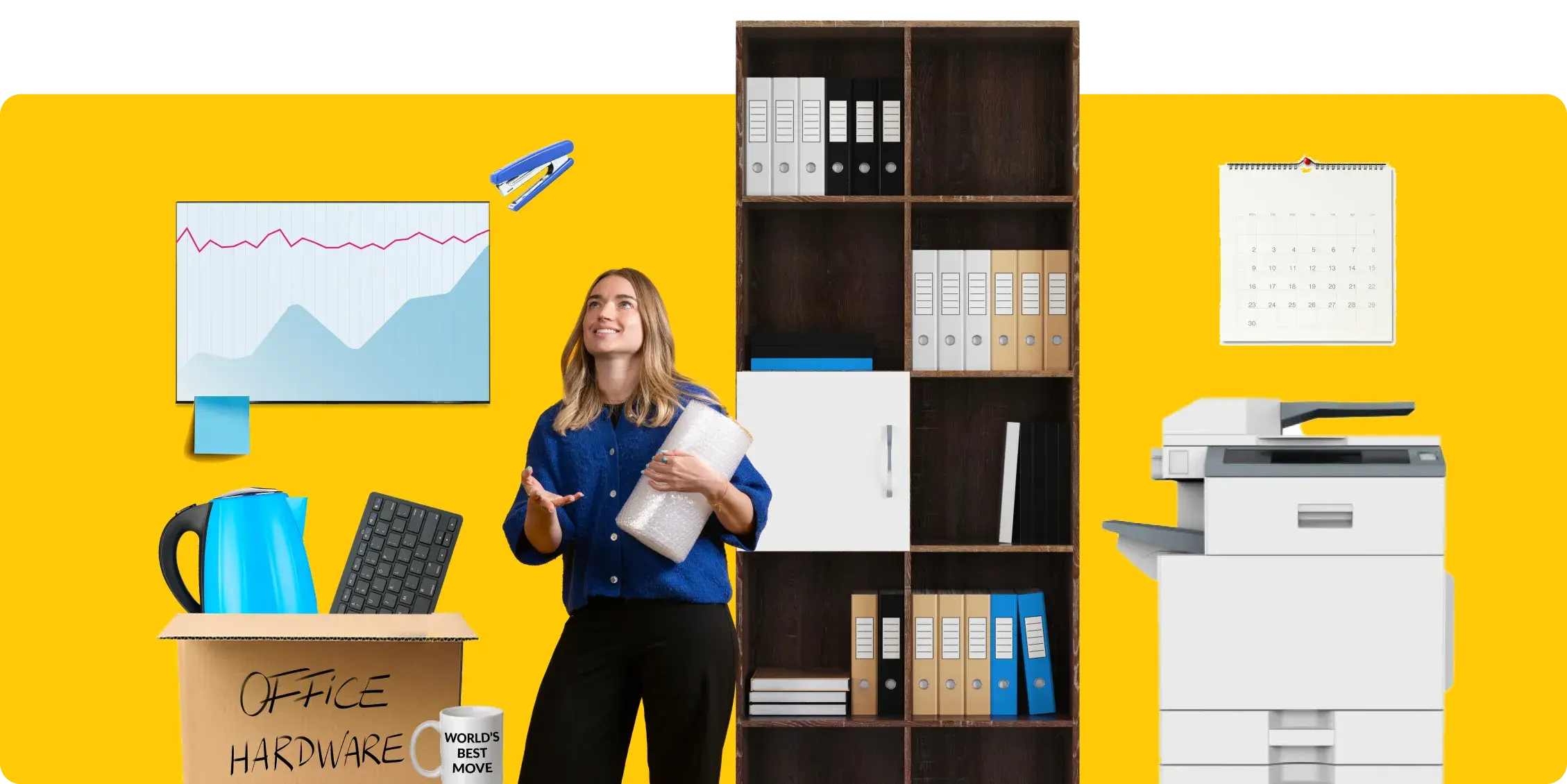As companies scale up, take on more workers or simply expand their client base, it can often be necessary to find somewhere that offers more office space and a better location. Between choosing a new office and finding a way to get employees and equipment over to the new address, all while disrupting business activities as little as possible, having to move office can make moving house look like a cake walk!
While individual movers can simply book time off work, things aren’t quite as simple for companies. If managers and employees do not take the time to reschedule key client appointments or arrange to work from home (if this is even possible), a moving day could result in lost revenue and scores of unhappy customers. Then there is the issue of having to move expensive equipment like computers and printers, which can cost thousands to replace in the event of an accident. Finally, if a company fails to arrange for utilities, phone lines and broadband to be set up at its new location, there can be even more expensive delays in getting everything running as normal.
While many larger businesses will set up shop in a single location for decades, the UK currently has a growing number of SMEs and startups. Office moves are becoming more common as a result, with more and more managers looking for advice on how to make the transition as smoothly as possible.
With that in mind, let’s take a look at the most important things you need to consider when moving office!
Choose an experienced office moving company
Given how business-minded most businesses tend to be (go figure), it is not uncommon for managers to focus solely on the bottom line when it comes to organising office moves. It may be that you are tempted to opt for the cheapest van and man option, or even to ask employees to donate vehicles and take a share of the workload in place of a professional moving team.
However, this approach has several drawbacks. One of the biggest is insurance, as employees and casual workers will not have coverage in the event that:
They injure themselves while on the jobThey damage your office equipment while on the jobProfessional office removal companies, on the other hand, will have insurance for both their employees and your belongings, as well as those nicely sized moving vans which can do the jobs of several employee vehicles.
There is also the simple matter of expertise. Moving companies based in or around popular business districts will have a great deal of experience in planning and executing office moves. For one, they will be able to offer sufficiently safe packaging for expensive equipment like laptops and printers. They will also be able to advise you on what you need to take into account in terms of organisation, such as the time you will need to leave, what kind of access will be required for vehicles and what will need to be set up in advance in order to get your new office connected.
It is also worth taking into account that, with the amount you will save on hiring and insuring your own removal vehicle(s), it can actually be cheaper to hire a professional removal company than to handle everything yourself!
Be sure to collect quotes from at least five local providers, and check through reviews for each of your candidates before making a decision. If you are friendly with other managers in your area, they may even be able to recommend a company on your behalf!
Announce your office relocation
Any good business person knows the importance of planning. As soon as you start the process of arranging your move, you will want to announce it to your staff. Not only will they be able to outline exactly what they will need from the new office in terms of space, outlets, facilities and so on, but they will also be able to start organising the move on a departmental basis.
Once you have chosen a location, your staff can start planning the structure of the new office, including where equipment and furniture will go. Some employees may volunteer to help on the day, or you could even form a ‘relocation team’ to start packing everything away.
Most importantly, this notice will give key managers and executives plenty of time to plan around the move itself. They can inform clients and customers about having to reschedule meetings and deadlines, or arrange to work remotely so that the moving day has less of an impact on productivity. Remember, programs like Slack or Skype can do wonders for keeping in contact with employees on moving days!
Inform removers about your equipment
An important lesson for any moving day is to tell your removers exactly what you will be taking with you so that they can provide the necessary manpower, vehicles, insurance and safe packaging to accommodate your needs.
For an office move, you will want to be particularly clear about your electronics. This can include:
MonitorsComputer towersLaptopsKitchen appliancesKeyboards and computer mousesPrinters and scannersWebcamsKeep in mind just how expensive this kind of equipment can be to replace. Because of this, your removers will want enough notice to ensure that they can provide adequate insurance coverage. In the event of an unforeseen accident, you could find your most key employees lacking the electronics they need to do their work. With adequate (Public Liability Insurance PLI) and Goods in Transit insurance coverage, you should be able to secure replacements quickly and without issue.
If there is anything that you do not absolutely need to take, it may be worth selling or freecycling it. This will save you time and hassle on the moving day itself, and you could even use it as an excuse to splash out for some new furniture or decor.
Make sure you are connected
Most businesses nowadays have a heavy reliance on staying online. Moving to a new office can be disastrous if you fail to secure an internet connection, to say nothing of water, heating and energy.
Before the big move, get in touch with the current suppliers for your new office to see what they can offer. Next, check out rates from other providers in your area and collect quotes to find the best deals available.
It will also be important to inform your current providers about your moving date. More than likely, they will offer their own rates in order to keep you on. If not, they will require your meter readings in order to deliver your final bills.
If, on the other hand, you are simply moving from one rented office to another, the building managers should be able to arrange all of this on your behalf.
Start packing
Packing is not something that anyone looks forward to, but everybody knows the importance of starting early. Begin with any unnecessary equipment or furniture: anything that you do not need to use on a daily basis. Everything else can wait until just before your move, though depending on the items in question you may also need to secure specialist packaging ahead of time.
If you cannot spare employees to help with this, you can have your removal company pack everything on your behalf. Remember, the materials and experiences that they will have on offer should make the job go far more smoothly.
Another popular alternative is to treat packing like a team-building exercise. A little physical work can be a fun break from the norms of office life, and it could even make your staff more enthusiastic for the move!
Of course, during the packing process, you will also find out just how much junk you have lying around. Depending on how much you need to throw away, you may want to consider hiring a skip.
Access
This is a big one! If you will not be able to actually get into your office when you arrive, you will face serious delays in getting everything set up. Even worse, having to keep your movers on for additional hours will land you with some serious late fees.
Make sure that you contact the building manager or landlord WELL in advance to trade keys, access cards or door codes, as necessary. With a written record of when you were supposed to gain entry to your new office, it should be easy to bill the at-fault-parties for any resulting fees.
Another important issue here will be parking. If spaces are limited, or the costs are particularly high, you will need to inform your movers in advance. Nothing upsets a removal firm more on the day than finding out they are being charged hundreds in parking tickets!
Share contact information
As a final precaution, you will want to make sure that you and your employees can remain connected during your moving day. It may be that you just want to keep track of those who are working remotely, but it will also be highly valuable in the event of any problems which delay the setup of your new office.
So, before the moving day itself, ask employees to trade email addresses and mobile phone numbers with you.

















